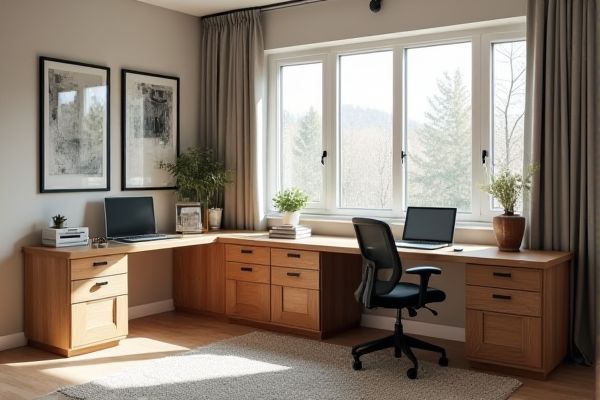
A compact desk offers space-saving benefits ideal for small rooms or limited workspaces, while a full-size desk provides ample surface area for multiple monitors, paperwork, and accessories, enhancing productivity for larger tasks. Discover which desk style best fits Your workspace needs by exploring detailed comparisons in the following article.
Table of Comparison
| Feature | Compact Desk | Full-Size Desk |
|---|---|---|
| Dimensions | Small footprint; typically 30-45 inches wide | Larger footprint; typically 50-72 inches wide |
| Space Efficiency | Ideal for small rooms and limited spaces | Requires more room; ideal for spacious offices |
| Storage Options | Limited or minimal storage | Usually equipped with drawers and shelves |
| Work Surface | Smaller surface area; suited for laptops and light tasks | Larger surface area; supports multiple monitors and extensive workspace |
| Portability | Lightweight and easy to move | Heavy and more stationary |
| Price Range | Generally more affordable | Typically higher cost due to size and features |
| Best For | Students, small apartments, or minimalists | Professionals, home offices, and multitasking setups |
Introduction to Compact Desks and Full-Size Desks
Compact desks maximize space efficiency with smaller footprints, ideal for limited areas like apartments or home offices. Full-size desks offer expansive work surfaces and additional storage options, catering to professionals needing extensive workspace for multiple monitors or documents. Choosing between compact and full-size desks depends on spatial constraints and specific functional requirements.
Space Efficiency: Which Desk Fits Your Room?
Compact desks maximize space efficiency by offering a smaller footprint, ideal for tight rooms or home offices with limited square footage. Full-size desks provide ample workspace and storage options but require a larger room to accommodate their dimensions comfortably. Assessing your room size ensures your desk choice boosts productivity without overcrowding your environment.
Functionality and Storage Options
Compact desks maximize functionality in small spaces by incorporating built-in shelves, drawers, and cable management systems, making them ideal for minimal setups. Full-size desks offer extensive storage options with larger drawer units, file cabinets, and ample surface area, supporting multitasking and organizational needs. Choosing between the two depends on space availability and whether prioritized storage or workspace takes precedence.
Aesthetic Appeal: Modern vs Traditional Designs
Compact desks often feature sleek, modern designs with clean lines and minimalist aesthetics, making them ideal for contemporary spaces. Full-size desks typically embrace traditional design elements such as rich wood finishes, ornate details, and classic craftsmanship that convey a timeless elegance. The choice between compact and full-size desks significantly impacts the room's aesthetic, balancing modern simplicity against traditional sophistication.
Ergonomics and Comfort Considerations
Compact desks often sacrifice ergonomic features due to limited space, potentially causing discomfort during extended use. Full-size desks provide ample surface area to accommodate ergonomic accessories like adjustable keyboard trays and monitor stands, enhancing posture and reducing strain. Choosing the right desk depends on your workspace needs and commitment to maintaining a comfortable, ergonomic setup.
Ideal Users: Who Benefits from Each Desk Type?
Compact desks are ideal for individuals with limited space, such as apartment dwellers, students, or remote workers needing a minimal footprint without sacrificing workflow efficiency. Full-size desks benefit professionals requiring ample surface area for multiple monitors, paperwork, or creative projects, including designers, executives, and gamers. Choosing the right desk depends on Your workspace, usage intensity, and organizational needs.
Assembly and Portability
Compact desks offer quicker assembly times due to fewer components and simpler designs, making them ideal for small spaces or frequent relocations. Their lightweight frames enhance portability, allowing easy movement between rooms or apartments without the need for tools. Full-size desks typically require more complex assembly processes and are heavier, limiting portability but providing greater stability and workspace.
Budget Comparison: Cost Differences
Compact desks typically range from $50 to $150, making them a more budget-friendly option for small spaces or temporary setups. Full-size desks generally cost between $150 and $500, reflecting their larger surface area and additional storage features. For buyers prioritizing cost efficiency, compact desks offer substantial savings without sacrificing basic functionality.
Durability and Material Choices
Compact desks typically use engineered wood or lighter materials to balance portability with durability, making them ideal for smaller spaces but sometimes less sturdy than full-size desks. Full-size desks often feature solid wood or metal frames, providing enhanced durability and long-term stability for heavy use and extensive equipment. Your choice depends on the durability needed and material preferences, with full-size desks excelling in robust construction and compact desks favoring lightweight, space-saving designs.
Making the Right Choice: Compact or Full-Size Desk
Choosing between a compact desk and a full-size desk depends on available space and intended use, with compact desks offering space-saving benefits ideal for small rooms or minimalistic setups. Full-size desks provide extensive work surface area suitable for multitasking and accommodating multiple monitors or office supplies, enhancing productivity in larger workspaces. Assess ergonomic needs, storage requirements, and room dimensions to make an informed decision tailored to personal workflow and environment.
 homyna.com
homyna.com